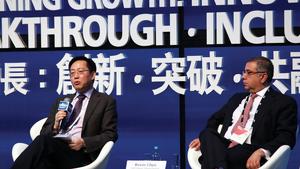 Kevin Chen (left), chair professor of Zhejiang University and senior research fellow of the International Food Policy Research Institute, makes a point during the panel discussion. (PARKER ZHENG / CHINA DAILY)
Kevin Chen (left), chair professor of Zhejiang University and senior research fellow of the International Food Policy Research Institute, makes a point during the panel discussion. (PARKER ZHENG / CHINA DAILY)
In an age when digital agriculture is being actively promoted, greater private capital should be injected into the agriculture industry to ensure its balanced development, according to an academic.
“The financial demand for agriculture is quite large, but public capital is limited. At this point, we need to get more private funds into the industry,” Kevin Chen Zhigang, a senior research fellow at the International Food Policy Research Institute, urged on the sidelines of the Asian Financial Forum 2020 on Tuesday.
The financial demand for agriculture is quite large, but public capital is limited. At this point, we need to get more private funds into the industry
Kevin Chen Zhigang, senior research fellow at the International Food Policy Research Institute
China now provides more than 1 trillion yuan annual support to its agricultural and rural sectors. In particular, the agricultural research and development sector is dominated by public funds.
But, too much public capital is likely to crowd out private funds if not allocated and used correctly, said Chen. At present, private money is estimated to account for just 20 percent of the total investments in agricultural research and development. Such a proportion is far less than that in some key agricultural nations like the United States and the Netherlands, where private funds take up about half of the sector’s total investments on agriculture.
“But, this is easy to understand. Investors pursue profits, while agriculture is an industry with high risks and long payback periods,” said Chen.
He urged the private sector to get engaged in agriculture through some blended financing models that involve both sides, such as public-private partnerships. By so doing, public money from the government and non-governmental organizations could help reduce risks that private capital may face in the initial stages.
Chen noted that agricultural scientific research is one of the segments which are in need of capital. With the rapid development of mechanized and digital agriculture, new technologies have been deployed to ensure food security.
Technologies, including wireless tools, data collectors and crop monitors, have been adapted during the production process. Farmers could harness real-time data on production costs, speed and output. They are also able to obtain information including how light can affect crops, and which crops are starved for water or afflicted with disease or pests.
Some startups with these technologies have drawn interest from investors. VSS — a Hong Kong-based company using non-contact sensors and system construction to provide solutions for digital farming — has secured an investment from a local fund.
At the same time, increasingly health-conscious consumers care more about what’s in their food, pushing vendors to boost the transparency of their supply chains and track the route of products to the market through suppliers and shippers.
Food safety education is a key area for private investors as well, as it could guide consumers’ eating habits and reduce food-borne diseases, said Chen.
The Food and Agriculture Organization and the World Health Organization have stressed that safe food is critical to promoting health and eradicating hunger — two of the primary aims of the Sustainable Development Goals. Safe food production also improves sustainability by enabling market access and productivity, which drives economic development and poverty alleviation, especially in rural areas.
According to the WHO, investment in consumer food safety education has the potential to return savings of up to US$10 for each dollar invested.


